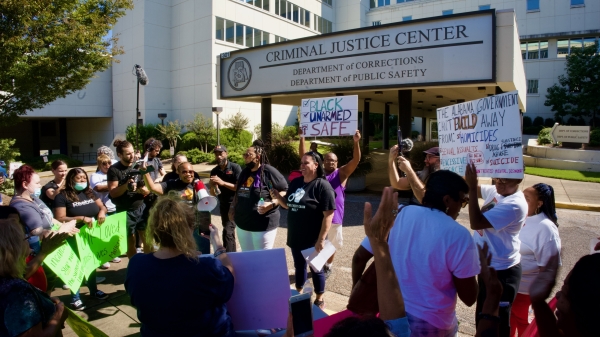The U.S. Department of Justice on Wednesday filed a lawsuit against the Mobile County Sheriff’s Office and Mobile County Sheriff Sam Cochran, alleging female correctional officers are subjected to a sexually hostile work environment.
The lawsuit alleges that the sheriff’s office discriminated against current and former female corrections officers and other female workers on the basis of sex, in violation Title VII of the Civil Rights Act of 1964, according to a press release by the justice department.
The lawsuit, filed in the District Court of the Southern District of Alabama, states that current and former female corrections officers “and similarly situated female employees have been and continue to be frequently subjected to sexual harassment by male inmates who expose their genitals, masturbate, and direct sexual slurs, sexual propositions, threats of sexual violence, and sexually degrading comments at female employees.”
“Defendants have failed to take prompt and effective action to remedy this harassing conduct,” the complaint continues.
“Nobody deserves to be sexually harassed while on the job,” said Principal Deputy Assistant Attorney General Pamela Karlan of the Civil Rights Division, in a statement. “The behavior to which these female employees were subjected is appalling, and the County’s failure to take action to protect its employees from such conduct is inexcusable.”
The lawsuit was the result of twelve female officers who filed charges of sex discrimination with the U.S. Equal Employment Opportunity Commission, which investigated the matter and found there to be a reasonable basis to believe violations of the workers’ protections under Title VII had occurred, according to the release.
“After unsuccessful conciliation efforts by the EEOC, the charges were referred by the EEOC to the Justice Department,” the release states.
Approximately 73 percent of the correctional officers at the jail are women, according to the complaint, who, because of the constant harassment suffer “mental anguish, stress, anxiety and depression; fear and other emotional distress; headaches; chest pains; insomnia and other physical symptoms; loss of sexual desire; mental anguish when going to work; burnout; and loss of sick leave when compelled to take leave in order to avoid or escape the incessant sexual harassment.”
Jail administrators have often lost or ignored complaints over the harassment, released inmates early from administrative segregation, and rejected reports “on the basis that the narratives were not sufficiently graphic,” according to the court filing.
The complaint states that female correctional officers who are identified in the complaint have been told by jail administrators about their concerns “If you stopped wearing perfume and tight uniforms, and stopped getting your hair done the inmates would stop masturbating at you” and “You shouldn’t be looking so cute.”
The federal government is asking the court to require that the defendants develop policies and procedures to prevent and correct harassment of female officers, and to award compensatory damages to the female workers, in addition to back pay and other lost benefits, according to the lawsuit.





















































